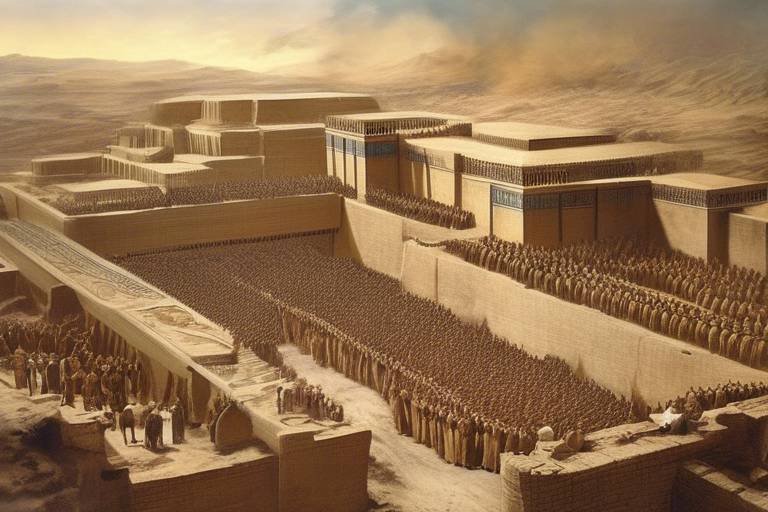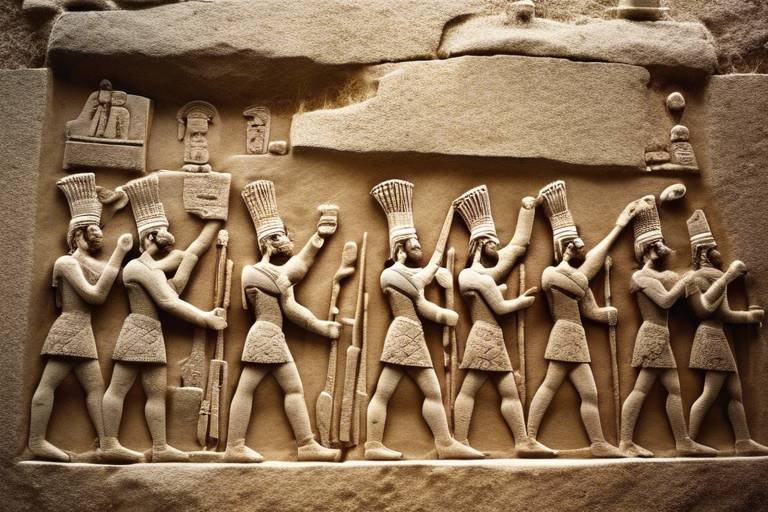The Decline of the Aksumite Empire - Historical Perspectives
Exploring the factors that led to the decline of the Aksumite Empire, a powerful ancient civilization in East Africa, through the lenses of historical analysis and archaeological evidence.

Economic Challenges
Exploring the factors that led to the decline of the Aksumite Empire, a powerful ancient civilization in East Africa, through the lenses of historical analysis and archaeological evidence.
Investigating how economic factors such as trade routes, currency devaluation, and resource depletion contributed to the downfall of the Aksumite Empire.
The economic challenges faced by the Aksumite Empire played a significant role in its decline. The disruption of vital trade routes, which were the lifeblood of the empire's economy, severely impacted its prosperity. With the alteration of trade patterns and the emergence of new routes, Aksum lost its once-thriving commercial advantage, leading to a decline in revenue and economic instability.
Currency devaluation further exacerbated the economic woes of the empire. The diminishing value of Aksumite coinage eroded confidence in the monetary system, causing inflation and disrupting economic transactions. This monetary crisis weakened the empire's financial foundation and undermined its ability to sustain its economic activities.
Resource depletion also posed a significant challenge to the Aksumite Empire. The exploitation of natural resources, such as timber and minerals, without sustainable practices led to environmental degradation and scarcity. As vital resources dwindled, the empire struggled to support its population and maintain its economic infrastructure, ultimately contributing to its economic downfall.

Political Instability
Political instability played a pivotal role in the gradual decline of the once-mighty Aksumite Empire. The empire faced numerous challenges on the political front, ranging from internal power struggles to external threats that weakened its central authority and governance. Succession crises, often accompanied by violent conflicts among competing factions, destabilized the leadership structure and hindered effective decision-making processes. The lack of a clear line of succession led to power struggles that further fragmented the empire's political unity.
External invasions posed a significant threat to the stability of the Aksumite Empire. Constant conflicts with neighboring states and incursions by foreign powers drained the empire's resources and diverted attention from internal issues. The empire's inability to form strategic alliances or effectively defend its borders left it vulnerable to external aggression, leading to territorial losses and diminishing its influence in the region.
The weakening of the central authority due to political turmoil had a cascading effect on the administrative efficiency of the empire. Governance became increasingly fragmented, with regional governors and local rulers asserting more autonomy and challenging the supremacy of the imperial court. This decentralization of power eroded the empire's ability to enforce laws, collect taxes, and maintain social order, contributing to the overall decline of the Aksumite state.
Moreover, the lack of a coherent political vision and leadership direction further exacerbated the internal divisions within the empire. Different factions vying for control often pursued conflicting agendas, leading to a state of perpetual instability and uncertainty. The absence of strong, unified leadership during times of crisis weakened the empire's ability to respond effectively to external threats and internal challenges.

Religious Shifts
Religious shifts played a pivotal role in the transformation of the Aksumite Empire. The conversion to Christianity marked a significant turning point in the religious landscape of the region. The adoption of Christianity not only altered the spiritual beliefs of the Aksumite people but also influenced their cultural practices and societal norms. Churches and monasteries were constructed, and Christian rituals became integral to the daily lives of the population.
Moreover, the decline of traditional belief systems contributed to a shift in the power dynamics within the empire. As Christianity gained prominence, the influence of traditional religious leaders waned, leading to a restructuring of authority and influence. The transition to Christianity also had implications for the empire's relations with neighboring regions and trading partners, as religious affiliations often played a role in diplomatic interactions.
Additionally, the spread of Christianity facilitated connections with other Christian communities in the Mediterranean and beyond, opening up new avenues for cultural exchange and trade. The integration of Christian beliefs into the fabric of Aksumite society not only reshaped religious practices but also influenced the development of art, architecture, and literature.
However, the religious shifts were not without challenges. Resistance to the conversion efforts, especially from adherents of traditional belief systems, led to social tensions and conflicts within the empire. The coexistence of diverse religious practices also posed challenges to the unity of the empire, as differing beliefs sometimes clashed, creating divisions among the populace.
In conclusion, the religious shifts in the Aksumite Empire were a complex and multifaceted phenomenon that had far-reaching implications for the cultural, social, and political landscape of the region. The transition to Christianity marked a significant chapter in the empire's history, shaping its identity and leaving a lasting impact on the legacy of the Aksumite civilization.

Social Unrest
Social unrest played a pivotal role in the gradual unraveling of the Aksumite Empire, disrupting the once cohesive fabric of society and contributing to its ultimate decline. The stratification of social classes, exacerbated by economic disparities and political turmoil, fueled discontent among the populace. As the gap between the elite and the common people widened, grievances simmered beneath the surface, leading to widespread dissatisfaction and unrest.
The eruption of rebellions and uprisings across the empire further destabilized the already fragile social order. Peasant revolts, fueled by grievances over land rights, taxation, and labor exploitation, posed a significant challenge to the authority of the Aksumite rulers. The inability of the central government to effectively address these social grievances only served to escalate tensions and sow seeds of discord within the empire.
The breakdown of social cohesion and unity, once the hallmark of Aksumite society, weakened the empire from within. Discontent and disillusionment among the populace eroded the sense of collective identity and shared purpose that had sustained the empire for centuries. As social divisions deepened and trust in the ruling elite waned, the foundations of the Aksumite Empire crumbled under the weight of internal strife and unrest.

Environmental Factors
Exploring the factors that led to the decline of the Aksumite Empire, a powerful ancient civilization in East Africa, through the lenses of historical analysis and archaeological evidence.
When delving into the environmental factors that played a pivotal role in the downfall of the Aksumite Empire, we uncover a tapestry woven with the threads of nature's influence. Climate change, a silent but potent force, gradually altered the landscape that the Aksumites relied upon for sustenance. The once fertile soils, nurtured by ancient agricultural practices, began to degrade under the weight of deforestation and soil erosion. The very foundation of their civilization, intricately tied to the land, started to crumble as the environment shifted beneath their feet.
As the Aksumites grappled with the repercussions of environmental degradation, their agricultural productivity dwindled, leading to food scarcity and economic strain. The interconnected web of life that sustained their society was unraveling, pushing them towards a precarious edge. The lush forests that once provided resources and shelter now stood as stark reminders of a fading past, echoing the silent cries of a civilization in turmoil.
Moreover, the environmental challenges exacerbated by human activities hastened the decline of the Aksumite Empire. Unsustainable farming practices and unchecked exploitation of natural resources hastened the degradation of the land, leaving scars that marred the once vibrant landscape. The delicate balance between humanity and nature, once harmonious, tipped towards chaos as the consequences of environmental neglect reverberated through the empire.
In the face of these environmental adversities, the Aksumites found themselves locked in a struggle for survival, battling not only external threats but also the very land that had sustained them for generations. The echoes of their plight serve as a poignant reminder of the intricate dance between civilization and the environment, a dance whose missteps can lead to the downfall of even the mightiest empires.

Military Weakness
When delving into the historical analysis of the Aksumite Empire's decline, one cannot overlook the pivotal role played by military weakness in its downfall. The empire's military prowess, once a formidable force in the region, faced a series of challenges that ultimately led to its erosion and vulnerability.
One of the significant factors contributing to the military weakness of the Aksumite Empire was the recurrent conflicts with neighboring states. Continuous engagements in warfare not only drained the empire's resources but also strained its military capabilities, making it difficult to sustain prolonged campaigns and defend its borders effectively.
Moreover, the lack of strategic alliances further exacerbated the empire's military vulnerabilities. In a landscape where alliances could tip the scales of power, the Aksumite Empire's isolation and inability to forge strong partnerships left it isolated and exposed to external threats.
Defensive vulnerabilities also played a crucial role in the empire's military decline. Inadequate fortifications, outdated military tactics, and the inability to adapt to evolving warfare strategies left the Aksumite forces susceptible to invasions and incursions, weakening their overall defensive capabilities.
As military weaknesses continued to plague the Aksumite Empire, its ability to project power and maintain control over its territories diminished. The erosion of military strength not only impacted the empire's ability to expand its influence but also left it increasingly susceptible to internal dissent and external aggression.

Cultural Transformation
During the decline of the Aksumite Empire, a significant aspect that played a crucial role was the within the society. This transformation encompassed various elements that reshaped the fabric of Aksumite civilization, leaving a lasting impact on its identity and heritage.
One of the key aspects of cultural transformation was the assimilation of diverse ethnic groups into the Aksumite society. As the empire expanded and interacted with neighboring regions, it absorbed different cultural practices and traditions, enriching its own cultural tapestry.
Moreover, linguistic changes also marked the evolution of the Aksumite culture. The adoption of new languages and scripts reflected the influence of external interactions and the integration of diverse linguistic elements into the empire's communication systems.
Artistic expressions underwent a notable evolution during this period, showcasing the dynamic cultural landscape of the Aksumite Empire. From architectural achievements to intricate craftsmanship, the artistic endeavors of the Aksumites reflected a blend of indigenous styles and external influences.
This cultural transformation not only diversified the cultural heritage of the Aksumite Empire but also contributed to its resilience and adaptability in the face of changing circumstances. The fusion of various cultural elements created a unique identity for the empire, leaving a lasting imprint on the historical narrative of the region.

Legacy and Heritage
As we delve into the legacy and heritage of the Aksumite Empire, we uncover a rich tapestry of historical significance that continues to shape the cultural landscape of modern-day Ethiopia, Eritrea, and beyond. The enduring legacy of the Aksumite Empire resonates through the annals of time, leaving an indelible mark on the region's historical narrative and identity.
The Aksumite Empire's heritage is deeply intertwined with its remarkable achievements in architecture, trade, and governance. The iconic obelisks and stelae of Aksum stand as towering testaments to the empire's architectural prowess, showcasing intricate craftsmanship and engineering marvels that have stood the test of time.
Furthermore, the Aksumite Empire's role as a thriving center of trade and commerce in the ancient world has left a lasting impact on the economic development of the region. The legacy of the empire's extensive trade networks and bustling markets can still be felt in the vibrant commercial hubs of present-day Ethiopia and Eritrea.
Moreover, the Aksumite Empire's adoption of Christianity as the state religion has left an enduring legacy in the religious landscape of the region. The conversion to Christianity not only transformed the spiritual beliefs of the Aksumite people but also influenced the development of religious practices and traditions that continue to shape the faith communities of Ethiopia and Eritrea.
Additionally, the Aksumite Empire's cultural heritage is reflected in its diverse ethnic tapestry and linguistic diversity. The assimilation of various ethnic groups and the evolution of linguistic expressions within the empire have contributed to the rich cultural mosaic that defines the social fabric of modern-day Ethiopia and Eritrea.
As we reflect on the legacy and heritage of the Aksumite Empire, we are reminded of the enduring impact of this ancient civilization on the cultural, religious, and economic dynamics of the region. The legacy of the Aksumite Empire serves as a testament to the resilience and ingenuity of the people who once inhabited this magnificent empire, leaving a lasting imprint on the historical narrative of East Africa.
Frequently Asked Questions
- What were the main economic challenges faced by the Aksumite Empire?
The Aksumite Empire encountered economic difficulties due to disruptions in trade routes, currency devaluation, and depletion of natural resources. These factors contributed to the empire's decline over time.
- How did political instability impact the Aksumite Empire?
Political turmoil, succession disputes, and external invasions weakened the central authority of the Aksumite Empire, leading to a loss of governance control and contributing to its downfall.
- What role did religious shifts play in the decline of the Aksumite Empire?
The conversion to Christianity and the decline of traditional belief systems reshaped the cultural landscape of the Aksumite society, impacting social cohesion and traditional practices.
- What were the environmental challenges that affected the Aksumite civilization?
Environmental factors such as climate change, deforestation, and soil degradation had adverse effects on agricultural productivity and sustainability, impacting the empire's ability to support its population.
- How did military weaknesses contribute to the decline of the Aksumite Empire?
Military weaknesses, including conflicts with neighboring states, lack of strategic alliances, and defense vulnerabilities, played a significant role in the diminishing military power of the Aksumite Empire.



















